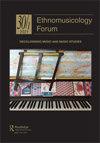Sideways nostalgia, adopted republicanism and the performance of Irish rebel songs in the GDR
IF 0.5
1区 艺术学
0 MUSIC
引用次数: 1
Abstract
ABSTRACT In the 1970s and ‘80s, several East German folk revival artists started playing Irish traditional music, long before reconnecting with German folk-song material that had been put into the service of extreme nationalist and racist propaganda during the Nazi era (1933–45). Drawing upon ethnographic research among former GDR folk musicians, this article proposes that many of these post-war artists aligned with the anti-colonial messages of Irish rebel songs, performing a veritable sense of ‘Irish’ Republicanism, a form of national pride that was considered more socially acceptable than indigenous patriotic German leanings. Adapting Boym’s (2001) concept of ‘sideways nostalgia’, and illustrating crucial distinctions between historical registers of German and Irish musical exceptionalism, the article purports to unravel trajectories through which this narrative of political alignment is fashioned and sustained, ultimately illustrating music’s capacity to sound nationalism’s polyphonic trajectories.横向怀旧,采用共和主义和爱尔兰反叛歌曲在德意志民主共和国的表演
摘要在20世纪70年代和80年代,几位东德民间复兴艺术家开始演奏爱尔兰传统音乐,早在与纳粹时期(1933-45)为极端民族主义和种族主义宣传服务的德国民歌素材重新联系之前。根据对前民主德国民间音乐家的民族志研究,本文提出,这些战后艺术家中的许多人与爱尔兰反叛歌曲中的反殖民信息一致,表现出真正的“爱尔兰”共和主义,这是一种民族自豪感,被认为比德国本土爱国倾向更容易被社会接受。这篇文章改编了博伊姆(2001)的“横向怀旧”概念,并说明了德国和爱尔兰音乐例外主义的历史记录之间的关键区别,旨在揭示这种政治结盟叙事的形成和维持轨迹,最终说明了音乐发出民族主义复调轨迹的能力。
本文章由计算机程序翻译,如有差异,请以英文原文为准。
求助全文
约1分钟内获得全文
求助全文
来源期刊

Ethnomusicology Forum
MUSIC-
CiteScore
1.10
自引率
25.00%
发文量
29
期刊介绍:
Articles often emphasise first-hand, sustained engagement with people as music makers, taking the form of ethnographic writing following one or more periods of fieldwork. Typically, ethnographies aim for a broad assessment of the processes and contexts through and within which music is imagined, discussed and made. Ethnography may be synthesised with a variety of analytical, historical and other methodologies, often entering into dialogue with other disciplinary areas such as music psychology, music education, historical musicology, performance studies, critical theory, dance, folklore and linguistics. The field is therefore characterised by its breadth in theory and method, its interdisciplinary nature and its global perspective.
 求助内容:
求助内容: 应助结果提醒方式:
应助结果提醒方式:


